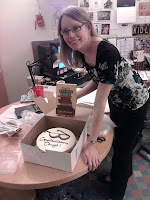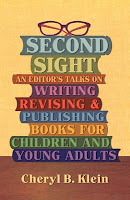(Continuing my series of monthly posts in which I write for an hour about more or less whatever is in my brain at the time.)
This has been a very good month--"an epoch in my life," as Anne Shirley would say--thanks to Second Sight and several other events. Trent Reedy's wonderful, world-changing Words in the Dust, previously featured here, has been named as the next book in Al Roker's Book Club for Kids on "The Today Show." You can read an excerpt of the book here if you haven't already seen it. (The campaign from that blog post raised $300 for Women for Afghan Women, by the way, and Trent and I both thank you for your support.)
And then Erin McCahan's I Now Pronounce You Someone Else was named as a finalist in two categories in the Romance Writers of America Awards: Best Young Adult Romance and Best First Novel (where it's competing against big old mean grown-up books too!). This really is a terrific recognition for a totally swoonworthy romance about what happens when you realize life can't always be lived as a totally swoonworthy romance. Plus other nice recognitions for Operation Yes and Eighth Grade Superzero and Marcelo in the Real World . . .
And then, yes, Second Sight came out at last, and was greeted with an ice-cream cake from my lovely boyfriend, many kind e-mails from people who have received it, and a ginormous sigh of relief from me. (Though the typo count is now up to four--grrr, arrgh.) Also a new kind of tension, though. I was talking with a writer at the wonderful Whispering Pines conference this past weekend about what it feels like to be an author; and having gotten over my terror at the book's initial release (or perhaps it's just mutated into this), the thing that keeps giving me pause now is that I like being invisible, often, and books are the opposite of invisibility. They are a claim staked, a space claimed (even if that space is just 5.5" x 8.5" x ~.8" in volume), principles declared, a flag planted, making oneself present in rooms where one has never been.
And this scares me for a very specific reason. . . . There's a talk in the book called "Morals, Muddles, and Making It Through," where I describe what happened when my best friends in fourth grade grew up much quicker than I did in fifth grade. I felt left behind, isolated, bewildered, all alone in a social world that suddenly seemed to be full of jokes I didn't get, focused on interests I didn't share. And I responded by doing my very best turtle imitation, avoiding anywhere I'd have to engage in social interaction, hiding in the library whenever I could (or the bathroom or a back bedroom if I had to go to a party--preferably a bedroom with a bookshelf). I don't have an Invisibility Cloak, but I long ago learned all the tricks available to Muggles for the same purpose: Know where your exits are at all times; don't look at the thing you're trying to avoid, because attention draws attention; wait for a burst of laughter, a noisy conversation, something to distract everyone, or better yet, leave the room at the same time as someone else, if the someone's bound for the bathroom or some such; move quickly and quietly, head down, eyes on your destination; don't look back. And then the deep breath once you're out, the return to the safety and lack of pressure of being alone. While I'm now a much more comfortably social person, someone who doesn't mind public speaking and can navigate a cocktail party pretty decently, my years of playing ghost gave me a taste for the freedom of invisibility . . . which is its own cage as well, I suppose, freedom being just another word for nothing left to lose and all that. But I was also thinking earlier this evening that one of the reasons I love New York is that it provides invisibility via sheer numbers: There are so many things to see and people to watch that it's very easy to hide in plain sight, all of us Purloined Letters of our own stories. . . .
(I really am rambling all over tonight; I feel almost lightheaded from tiredness but I want to try to finish this.) Anyway, again, putting out a book is the opposite of invisibility. And visibility carries responsibility, and I like to travel light, for fear of getting something wrong or hurting someone somehow or just because of everything I'm carrying already. (If a book is published and no one reads it, it still makes a sound, through its influence on the author and its physical existence if nothing else; and when people are reading it, then goodness--who knows how far that whisper might travel?) Maybe eventually I'll get used enough to this that I'll stop thinking "Oh, my, someone else is reading this now," with a little hitch of my heart, at every kind message or book sale. Do know I'm very grateful to every person who causes my heart to hitch.
(This has NOT been a passive-aggressive plea for compliments, by the way, should it come off that way; I meant the rumination on invisibility sincerely, and there's more to say on it later. Maybe April. Writers: Do you like being invisible? Or is what you love about writing the opportunity to plant your flag?)
For the record, if anyone wants to offer me a $500,000 advance, a la Barry Eisler, or a cool $2 million like Amanda Hocking, I'll take it. I'm liking self-publishing, but I'd be happy to sell out to the Man for the right price--especially when, heck, I am the Man, albeit in another market. And given the choice between true invisibility and flight, I'd go with flight, all the way.
This has been a very good month--"an epoch in my life," as Anne Shirley would say--thanks to Second Sight and several other events. Trent Reedy's wonderful, world-changing Words in the Dust, previously featured here, has been named as the next book in Al Roker's Book Club for Kids on "The Today Show." You can read an excerpt of the book here if you haven't already seen it. (The campaign from that blog post raised $300 for Women for Afghan Women, by the way, and Trent and I both thank you for your support.)
And then Erin McCahan's I Now Pronounce You Someone Else was named as a finalist in two categories in the Romance Writers of America Awards: Best Young Adult Romance and Best First Novel (where it's competing against big old mean grown-up books too!). This really is a terrific recognition for a totally swoonworthy romance about what happens when you realize life can't always be lived as a totally swoonworthy romance. Plus other nice recognitions for Operation Yes and Eighth Grade Superzero and Marcelo in the Real World . . .
And then, yes, Second Sight came out at last, and was greeted with an ice-cream cake from my lovely boyfriend, many kind e-mails from people who have received it, and a ginormous sigh of relief from me. (Though the typo count is now up to four--grrr, arrgh.) Also a new kind of tension, though. I was talking with a writer at the wonderful Whispering Pines conference this past weekend about what it feels like to be an author; and having gotten over my terror at the book's initial release (or perhaps it's just mutated into this), the thing that keeps giving me pause now is that I like being invisible, often, and books are the opposite of invisibility. They are a claim staked, a space claimed (even if that space is just 5.5" x 8.5" x ~.8" in volume), principles declared, a flag planted, making oneself present in rooms where one has never been.
And this scares me for a very specific reason. . . . There's a talk in the book called "Morals, Muddles, and Making It Through," where I describe what happened when my best friends in fourth grade grew up much quicker than I did in fifth grade. I felt left behind, isolated, bewildered, all alone in a social world that suddenly seemed to be full of jokes I didn't get, focused on interests I didn't share. And I responded by doing my very best turtle imitation, avoiding anywhere I'd have to engage in social interaction, hiding in the library whenever I could (or the bathroom or a back bedroom if I had to go to a party--preferably a bedroom with a bookshelf). I don't have an Invisibility Cloak, but I long ago learned all the tricks available to Muggles for the same purpose: Know where your exits are at all times; don't look at the thing you're trying to avoid, because attention draws attention; wait for a burst of laughter, a noisy conversation, something to distract everyone, or better yet, leave the room at the same time as someone else, if the someone's bound for the bathroom or some such; move quickly and quietly, head down, eyes on your destination; don't look back. And then the deep breath once you're out, the return to the safety and lack of pressure of being alone. While I'm now a much more comfortably social person, someone who doesn't mind public speaking and can navigate a cocktail party pretty decently, my years of playing ghost gave me a taste for the freedom of invisibility . . . which is its own cage as well, I suppose, freedom being just another word for nothing left to lose and all that. But I was also thinking earlier this evening that one of the reasons I love New York is that it provides invisibility via sheer numbers: There are so many things to see and people to watch that it's very easy to hide in plain sight, all of us Purloined Letters of our own stories. . . .
(I really am rambling all over tonight; I feel almost lightheaded from tiredness but I want to try to finish this.) Anyway, again, putting out a book is the opposite of invisibility. And visibility carries responsibility, and I like to travel light, for fear of getting something wrong or hurting someone somehow or just because of everything I'm carrying already. (If a book is published and no one reads it, it still makes a sound, through its influence on the author and its physical existence if nothing else; and when people are reading it, then goodness--who knows how far that whisper might travel?) Maybe eventually I'll get used enough to this that I'll stop thinking "Oh, my, someone else is reading this now," with a little hitch of my heart, at every kind message or book sale. Do know I'm very grateful to every person who causes my heart to hitch.
(This has NOT been a passive-aggressive plea for compliments, by the way, should it come off that way; I meant the rumination on invisibility sincerely, and there's more to say on it later. Maybe April. Writers: Do you like being invisible? Or is what you love about writing the opportunity to plant your flag?)
For the record, if anyone wants to offer me a $500,000 advance, a la Barry Eisler, or a cool $2 million like Amanda Hocking, I'll take it. I'm liking self-publishing, but I'd be happy to sell out to the Man for the right price--especially when, heck, I am the Man, albeit in another market. And given the choice between true invisibility and flight, I'd go with flight, all the way.










